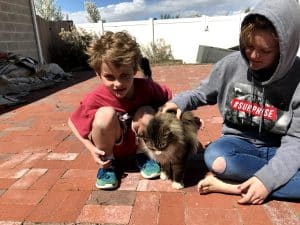By Sara Bybee Fisk
I am a student of The Living School. Part of the curriculum experience is an assignment to Circle Groups who meet online to learn from each other and from the curriculum.

I chose to join a circle group that is for BIPOC students, wanting to explore my own identity as a brown woman, and to learn from the experiences of other black and brown students. Our first meeting was on a Sunday, everyone flat on the glass surface of my computer screen.
A more seasoned Living School participant led us in an exercise to ground ourselves. My spine straightened and heart opened to the moment I was in; this was familiar and lovely.
Then, we were led in a practice of lament. The guide explained, “We are unaccustomed to stopping to lament; we carry many things we have not been able to release. What are the sorrows you carry with you? What are the sorrows of the world that we could be open to?”
Answers to the guide’s questions popped up in my head; suffering, sadness, worry…so many things to lament. I hesitated, breath caught in my chest- why go there?
I am not a person who likes to feel sorrow; it looks about as inviting as a dark, black, bottomless pool. I usually skip the sorrow and go straight to anger or decide to not feel it at all. I was unconvinced that this was a good idea.
His voice continued “When we lament, we open ourselves to the truth of what is going on around us in a new way, we willingly feel the pain and suffering of others, and we feel our own sorrow in an honest way. This is part of telling the truth about the world and about ourselves. Trust yourself to lament and to learn.”
I opened to the possibility.
I felt a wave swell from deep in the pit of my stomach and rise through my whole body- sorrow. My chest tightened, and I breathed. My eyes teared up, and I breathed. My head felt hot and clenched, and I just breathed. I didn’t fight the sorrow, I didn’t shove it down. I allowed it to just come.
My heart broke; I felt it crack open and the sorrow gushed. So much sorrow; my own, and the sorrow I’ve witnessed poured forth and I could not stop it.
I lamented the poverty in the world that I see but cannot fix; so many that need and lack.
I lamented the lack of loving spaces for children, for LGBTQ+ people
I lamented prisons burgeoning with humans for whom we have no plan other than to pay and incentivise corporations to keep them locked away.
I lamented the land, pillaged and damaged.
I lamented the fear and judgement I carry for people who don’t think like I do.
I lamented, and lamented, and lamented.
I let myself just feel all of it, wave after wave.
“What did you learn?” asked our guide’s voice, bringing my heart back to myself, sitting in my office. I was breathing, raw and surprised.
I learned that connecting to lament meant mourning in an uncalculated way- it felt both scary and freeing.
I learned that I could give myself over to lamenting and it could actually connect me to others in shared sorrow that I willingly felt rather than tried to control.
I learned new meaning in Jesus’ lamenting for those He loved and wanted to heal, and the lamenting of those who are seeking healing and not finding it.
It didn’t swallow me alive; lament was a guide that showed me the work that there is to do in the world and gave me a way to experience it up close and truthfully, not at a safe distance.
Lament deepened me; deepened my gratitude, deepened my resilience, deepened my resolve to lift the heaviness of the hands that hang down.
I don’t know that everyone needs to learn to lament the way I did, it’s certainly a mark of my privilege and emotional inexperience. And certainly there are those that live with it every day and need no guide. But there are those who might; so I offer my experience.
These days, lament is with me in a new way. It is with me when I meditate and I willingly mourn with those that mourn; it is with me in my heart, a new space hollowed out whose only purpose is constant acknowledgment. It is with me in my prayers and yearnings to help in healing the things that I can heal, including myself.
And it is good.






8 Responses
Beautiful.
I love this word ‘lament’. it has a different connotation than ‘grief’, but is related. this gives me something to think about
I dont understand what you mean when you said, “learning to lament…is a mark of my privilege”. Would you mind expanding on that?
Yes of course. What I mean is that for marginalized/vulnerable people, lament is part of their experience that they can’t escape. My privilege (education/financial/reproductive etc) has insulated me from lament so I had to “learn” it. It wasn’t an inescapable part of my existence for so many privileged reasons. Hope that explains it- if not I’d love to try to answer again <3
This is beautiful. I’ve thought a lot about grief this week as my family has mourned the unexpected loss of my uncle. I don’t feel like I was raised with sufficient traditions of grief, but I’ve found it so healing to create space and time for lament.
Thank you for taking the time to express & teach this.
This is beautiful…I am a person who tends to dwell in the lamenting, and I fear my anger. It’s so interesting to look deeply into the feelings we are scared to feel. Thank you for this piece; it has given me a lot to ponder.
Thank you for this post. It made me think about lamenting in a new way.